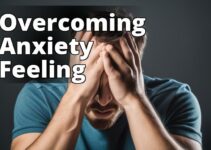Are you looking to understand anxiety disorder symptoms and their impact on mental well-being? This comprehensive article will delve into anxiety disorder symptoms, their causes, impact, and various management strategies, catering to the needs of individuals seeking information and support for anxiety-related concerns.
What You Will Learn About Anxiety Disorder Symptoms
- Learn about the common symptoms of anxiety disorders, including physical, emotional, and behavioral signs.
- Discover the impact of anxiety disorder symptoms on daily life, work, and relationships.
- Explore the various treatment options, coping mechanisms, support systems, and long-term management strategies for dealing with anxiety disorder symptoms.
Types of Anxiety Disorders
Anxiety disorders encompass various conditions, each with distinct features and symptoms, including:
Generalized Anxiety Disorder (GAD)
Characterized by excessive worry and anxiety about various aspects of life, often without a specific cause.
Panic Disorder
Involves recurrent, unexpected panic attacks, accompanied by intense physical symptoms such as heart palpitations, sweating, and a sense of impending doom.
Social Anxiety Disorder
Causes overwhelming self-consciousness and anxiety in social situations, leading to avoidance of social interactions.
Specific Phobias
Intense fears of specific objects or situations, leading to significant distress when encountered.
Common Symptoms of Anxiety Disorders
Anxiety disorder symptoms can manifest in various ways, encompassing physical, emotional, and behavioral aspects.
Physical Symptoms
| Symptoms | Description |
|---|---|
| Rapid Heartbeat | Racing or pounding heartbeat with chest discomfort |
| Sweating | Profuse sweating, especially in stressful situations |
| Trembling | Uncontrollable shaking, particularly in the hands |
| Shortness of Breath | Feeling breathless or experiencing rapid, shallow breathing |
Emotional and Behavioral Symptoms
- Excessive Worry: Persistent and exaggerated worry about everyday situations, often with a lack of control over the worrying.
- Irritability: Restlessness and irritability, even in the absence of clear stressors.
- Difficulty Concentrating: Anxiety can lead to difficulty focusing, decision-making, or retaining information.
- Avoidance Behaviors: Individuals may avoid situations or places that trigger anxiety, leading to disruptions in daily life.
Physical Manifestations of Anxiety Disorders
In addition to immediate symptoms, there are several physical manifestations that can persist over time:
Muscle Tension
Prolonged anxiety can lead to persistent muscle tension, contributing to discomfort and stiffness, particularly in the neck, shoulders, and back.
Insomnia
Sleep disturbances, including difficulty falling asleep and staying asleep, are common among individuals with anxiety disorders, further exacerbating feelings of fatigue.
Gastrointestinal Problems
Anxiety can manifest as gastrointestinal issues, such as stomach aches, nausea, diarrhea, or other digestive disturbances.
Fatigue
Chronic anxiety can lead to persistent feelings of fatigue and exhaustion, impacting overall quality of life.
Emotional and Behavioral Signs
Anxiety disorders can significantly influence emotional well-being and behavior, leading to notable changes in daily functioning:
Constant Fear and Worry
The presence of persistent, excessive fear and worry significantly affects emotional stability and overall well-being.
Agitation and Restlessness
Feelings of agitation, restlessness, and an inability to relax are common emotional and behavioral signs associated with anxiety disorders.
Impact on Personal Relationships and Work Performance
Anxiety symptoms can strain personal relationships and hinder professional performance, leading to social withdrawal and decreased productivity.
Impact on Daily Life
The impact of anxiety disorders extends beyond the individual, affecting various aspects of daily life:
Effect on Functioning at Work and School
Anxiety symptoms can impair concentration, decision-making, and overall performance, impacting both academic and professional endeavors.
Impact on Social Situations
Social interactions can become challenging, leading to avoidance of gatherings, events, and other social activities, further exacerbating feelings of isolation and distress.
Seeking Professional Help for Anxiety Symptoms
Recognizing the signs of anxiety disorders is the first step toward seeking professional help and support.
Importance of Seeking Professional Help
Seeking professional guidance is crucial for accurate diagnosis, personalized treatment, and ongoing support for individuals experiencing anxiety symptoms.
Types of Mental Health Professionals
When seeking help for anxiety symptoms, individuals may consult psychologists, psychiatrists, or other mental health professionals specializing in anxiety disorders and related conditions.
Support and Treatment Options
Various treatment options, including therapy, medication, and self-care strategies, can significantly alleviate anxiety symptoms and improve overall well-being.
“Internal links play a crucial role in establishing the architecture of a website and guiding users to relevant content.” – John Mueller
Treatment Options for Anxiety Disorder Symptoms
Effective management of anxiety disorder symptoms involves a multifaceted approach, encompassing various treatment modalities.
| Pros | Cons |
|---|---|
| Cognitive-Behavioral Therapy (CBT) | – Requires consistent attendance and effort |
| Exposure Therapy | – May initially increase anxiety levels |
| Medication | – Potential side effects |
| Exercise | – Requires motivation and consistency |
| Relaxation Techniques | – Takes time to master |
| Stress Management | – Learning curve for effective techniques |
Coping Mechanisms for Managing Anxiety Symptoms
In addition to formal treatment approaches, individuals can adopt various coping mechanisms to manage anxiety symptoms in daily life.
Mindfulness
Practicing mindfulness and being present in the moment can help individuals reduce anxiety and enhance their overall emotional well-being.
Deep Breathing Exercises
Utilizing deep breathing techniques, such as diaphragmatic breathing, can aid in reducing physiological arousal associated with anxiety, promoting a sense of calm.
Setting Realistic Goals
Establishing achievable goals and priorities can help individuals manage anxiety by providing a sense of purpose and direction.
Support Systems for Dealing with Anxiety Disorder Symptoms
Support from family, friends, and support groups can significantly impact an individual's ability to manage anxiety symptoms and navigate the challenges associated with anxiety disorders.
Role of Family and Friends
Understanding and compassionate support from loved ones can create a nurturing environment for individuals coping with anxiety, fostering a sense of security and comfort.
Support Groups
Participating in support groups or online communities dedicated to anxiety disorders can offer individuals an opportunity to share experiences, gain insights, and access valuable resources for managing their symptoms.
Addressing Stigma and Misconceptions about Anxiety Disorder Symptoms
Addressing stigma and misconceptions surrounding anxiety disorders is essential for promoting empathy, understanding, and effective support for individuals experiencing anxiety symptoms.
Addressing Stigma
Challenging stereotypes and misconceptions about anxiety disorders can help create a more inclusive and supportive environment for individuals seeking assistance and understanding.
Promoting Understanding and Empathy
Educating the public about the nature of anxiety disorders and the experiences of individuals living with these conditions can foster empathy and reduce stigma, encouraging more open discussions about mental health.
Knowing When to Seek Emergency Help for Anxiety Symptoms
Understanding when to seek emergency assistance for severe anxiety symptoms, such as panic attacks, is crucial for ensuring the safety and well-being of individuals experiencing acute distress.
Guidance on Seeking Emergency Help
Individuals experiencing severe panic attacks or overwhelming anxiety symptoms that affect their ability to function should seek immediate medical attention to receive prompt evaluation and support.
Dealing with Panic Attacks
Learning coping strategies and techniques to manage panic attacks, such as grounding exercises and controlled breathing, can aid individuals in navigating these distressing episodes.
Long-Term Management of Anxiety Disorder Symptoms
Long-term management of anxiety disorders involves ongoing support, treatment, and the cultivation of healthy coping mechanisms for sustained well-being.
Importance of Long-Term Management
Consistent monitoring, support, and engagement in treatment are essential for individuals managing anxiety disorders, promoting stability and quality of life.
Potential for Recovery
With appropriate treatment and support, individuals with anxiety disorders can experience significant improvement in symptoms and overall well-being, leading to a fulfilling and productive life.
Self-Assessment Tools for Understanding Anxiety Disorder Symptoms
Utilizing self-assessment tools and resources can aid individuals in gaining insight into their anxiety symptoms and seeking appropriate help.
Information on Self-Assessment Tools
Various self-assessment questionnaires and resources are available to help individuals evaluate their anxiety symptoms and determine the need for professional assistance.
Seeking Appropriate Help
Upon self-assessment, individuals can take proactive steps to seek professional help, leading to accurate diagnosis and tailored treatment plans.
Real-Life Experiences and Inspirational Stories
Sharing real-life experiences and inspirational stories of individuals who have navigated anxiety disorders can provide hope, encouragement, and valuable insights for those on a similar journey.
Real-Life Impact of Anxiety Disorder Symptoms
Overcoming Social Anxiety: A Personal Journey
Growing up, Sarah struggled with intense social anxiety. Simple tasks like speaking up in class or attending social gatherings left her feeling overwhelmed and isolated. As a result, she often found herself avoiding situations that triggered her anxiety, impacting her academic performance and personal relationships.
Seeking Professional Help and Support
After years of struggling, Sarah sought the help of a licensed therapist specializing in anxiety disorders. Through cognitive-behavioral therapy, Sarah learned to challenge her negative thought patterns and gradually expose herself to social situations. With the support of her therapist and understanding friends, Sarah began to make significant progress in managing her social anxiety.
Impact on Daily Life and Relationships
As Sarah's confidence grew, she noticed improvements in her work performance and social interactions. She was able to participate in group discussions without feeling paralyzed by fear and developed healthier coping mechanisms to manage her anxiety symptoms. Over time, Sarah's personal relationships flourished, and she was able to pursue social opportunities that were once daunting.
Conclusion
Sarah's journey highlights the real-life impact of anxiety disorder symptoms on daily life and the transformative power of seeking professional help and support. Her story serves as a source of inspiration for individuals navigating similar challenges and emphasizes the importance of understanding and managing anxiety symptoms.
Resources for Understanding and Managing Anxiety Disorder Symptoms
Access to reliable resources and support services is vital for individuals seeking to understand and manage anxiety disorder symptoms effectively.
Hotlines and Helplines
Hotlines and helplines provide immediate support and guidance for individuals experiencing acute anxiety symptoms or emotional distress.
Reputable Websites for Further Information
Reputable websites and online platforms dedicated to mental health offer valuable information, resources, and tools for understanding and managing anxiety disorders and related conditions.
Recommended Books
Books authored by mental health professionals and individuals with lived experiences of anxiety disorders can offer valuable insights, guidance, and support for individuals seeking to navigate anxiety-related challenges.
In conclusion, understanding anxiety disorder symptoms, their impact, and effective management strategies is essential for promoting mental well-being and providing support to individuals experiencing anxiety-related concerns. By fostering empathy, awareness, and access to valuable resources, we can contribute to a more supportive and inclusive environment for individuals living with anxiety disorders.
With a Ph.D. in Clinical Psychology from Stanford University, Benjamin Hayes has over 15 years of experience in researching and treating anxiety disorders. As a licensed clinical psychologist, Benjamin Hayes has conducted extensive studies on the impact of anxiety disorders on personal relationships and work performance, with several of their papers published in renowned journals such as the Journal of Anxiety Disorders and the Journal of Clinical Psychology. Their expertise in cognitive-behavioral therapies for anxiety management has been instrumental in developing effective treatment options. Benjamin Hayes has also worked closely with support groups and family systems to understand the role of a supportive environment in managing anxiety symptoms. Furthermore, they have been a keynote speaker at various mental health conferences, advocating for the destigmatization of anxiety disorders and promoting empathy and understanding. Their dedication to promoting mental health awareness and their vast experience in the field make Benjamin Hayes a trusted authority in anxiety disorder management.



